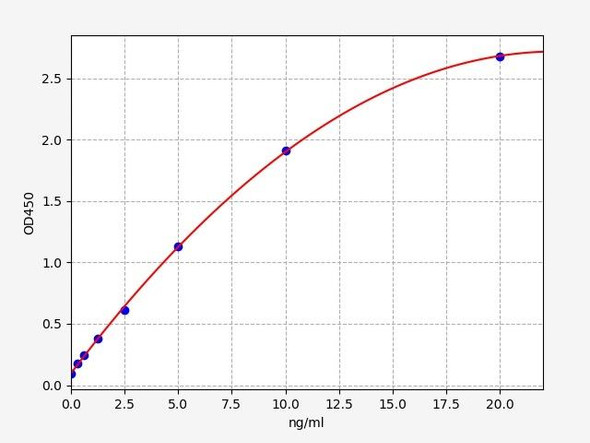Anti-COX2/PTGS2 Antibody (CAB3560)
- SKU:
- CAB3560
- Product Type:
- Antibody
- Antibody Type:
- Monoclonal Antibody
- Reactivity:
- Human
- Reactivity:
- Mouse
- Reactivity:
- Rat
- Host Species:
- Rabbit
- Isotype:
- IgG
- Synonyms:
- COX-2
- Synonyms:
- COX2
- Synonyms:
- GRIPGHS
- Synonyms:
- PGG/HS
- Synonyms:
- PGHS-2
- Synonyms:
- PHS-2
- Synonyms:
- hCox-2
- Research Area:
- Metabolism
Description
| Product Name: | COX2/PTGS2 Rabbit mAb |
| Product Code: | CAB3560 |
| Size: | 20uL, 50uL, 100uL |
| Synonyms: | COX-2, COX2, GRIPGHS, PGG/HS, PGHS-2, PHS-2, hCox-2 |
| Applications: | WB, IHC |
| Reactivity: | Human, Mouse, Rat |
| Host Species: | Rabbit |
| Immunogen: | A synthesized peptide derived from human COX2/PTGS2 |
| Applications: | WB, IHC |
| Recommended Dilutions: | WB 1:500 - 1:2000 IHC 1:50 - 1:200 |
| Reactivity: | Human, Mouse, Rat |
| Positive Samples: | HeLa, RAW264.7, Rat brain |
| Immunogen: | A synthesized peptide derived from human COX2/PTGS2 |
| Purification Method: | Affinity purification |
| Storage: | Store at -20°C. Avoid freeze / thaw cycles. Buffer: PBS with 0.02% sodium azide, 0.05% BSA, 50% glycerol, pH7.3. |
| Isotype: | IgG |
| Sequence: | Email for sequence |
| Gene ID: | 5743 |
| Uniprot: | P35354 |
| Calculated MW: | 75kDa |
| Observed MW: | 72kDa |
| UniProt Protein Function: | COX-2: Mediates the formation of prostaglandins from arachidonate. May have a role as a major mediator of inflammation and/or a role for prostanoid signaling in activity-dependent plasticity. Homodimer. Belongs to the prostaglandin G/H synthase family. |
| UniProt Protein Details: | Protein type:Oxidoreductase; Lipid Metabolism - arachidonic acid; EC 1.14.99.1 Chromosomal Location of Human Ortholog: 1q25.2-q25.3 Cellular Component: endoplasmic reticulum membrane; neuron projection; protein complex; cytoplasm; caveola; nucleus Molecular Function:prostaglandin-endoperoxide synthase activity; enzyme binding; peroxidase activity; protein homodimerization activity; arachidonate 15-lipoxygenase activity; metal ion binding; heme binding; lipid binding Biological Process: positive regulation of nitric oxide biosynthetic process; positive regulation of apoptosis; response to lithium ion; positive regulation of smooth muscle cell proliferation; response to glucocorticoid stimulus; response to lipopolysaccharide; positive regulation of NF-kappaB import into nucleus; decidualization; sensory perception of pain; prostaglandin biosynthetic process; negative regulation of synaptic transmission, dopaminergic; positive regulation of synaptic transmission, glutamatergic; response to estradiol stimulus; bone mineralization; negative regulation of cell cycle; negative regulation of cell proliferation; response to vitamin D; lipoxygenase pathway; nicotinamide metabolic process; negative regulation of smooth muscle contraction; regulation of blood pressure; arachidonic acid metabolic process; positive regulation of smooth muscle contraction; angiogenesis; inflammatory response; response to fructose stimulus; water-soluble vitamin metabolic process; positive regulation of prostaglandin biosynthetic process; response to drug; negative regulation of calcium ion transport; vitamin metabolic process; cyclooxygenase pathway; positive regulation of synaptic plasticity; learning; memory; prostaglandin metabolic process; hair cycle; response to manganese ion; ovulation; NAD metabolic process; regulation of inflammatory response; positive regulation of vasoconstriction; positive regulation of fever; brown fat cell differentiation; response to oxidative stress; cell motility; embryo implantation |
| NCBI Summary: | Prostaglandin-endoperoxide synthase (PTGS), also known as cyclooxygenase, is the key enzyme in prostaglandin biosynthesis, and acts both as a dioxygenase and as a peroxidase. There are two isozymes of PTGS: a constitutive PTGS1 and an inducible PTGS2, which differ in their regulation of expression and tissue distribution. This gene encodes the inducible isozyme. It is regulated by specific stimulatory events, suggesting that it is responsible for the prostanoid biosynthesis involved in inflammation and mitogenesis. [provided by RefSeq, Feb 2009] |
| UniProt Code: | P35354 |
| NCBI GenInfo Identifier: | 3915797 |
| NCBI Gene ID: | 5743 |
| NCBI Accession: | P35354.2 |
| UniProt Secondary Accession: | P35354,Q16876, A8K802, |
| UniProt Related Accession: | P35354 |
| Molecular Weight: | |
| NCBI Full Name: | Prostaglandin G/H synthase 2 |
| NCBI Synonym Full Names: | prostaglandin-endoperoxide synthase 2 (prostaglandin G/H synthase and cyclooxygenase) |
| NCBI Official Symbol: | PTGS2 |
| NCBI Official Synonym Symbols: | COX2; COX-2; PHS-2; PGG/HS; PGHS-2; hCox-2; GRIPGHS |
| NCBI Protein Information: | prostaglandin G/H synthase 2; PHS II; PGH synthase 2; cyclooxygenase 2b; prostaglandin H2 synthase 2 |
| UniProt Protein Name: | Prostaglandin G/H synthase 2 |
| UniProt Synonym Protein Names: | Cyclooxygenase-2; COX-2; PHS II; Prostaglandin H2 synthase 2; PGH synthase 2; PGHS-2; Prostaglandin-endoperoxide synthase 2 |
| Protein Family: | Prostaglandin G/H synthase |
| UniProt Gene Name: | PTGS2 |
| UniProt Entry Name: | PGH2_HUMAN |






